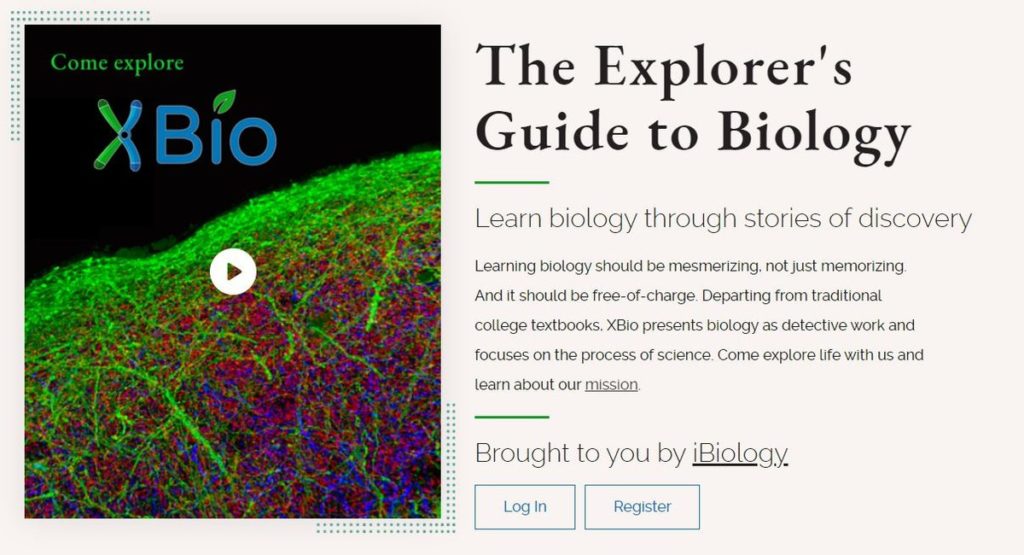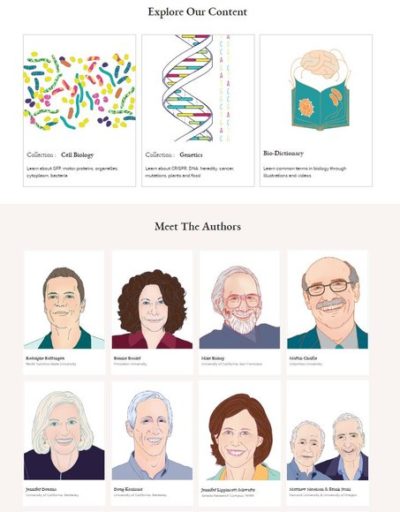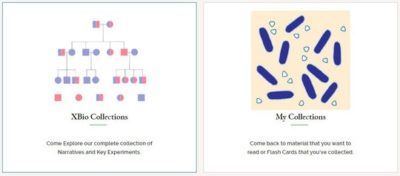
This month, iBiology, a nonprofit organization that produces free video lectures from the world’s leading biologists, launched the start of an introductory college textbook, called The Explorer’s Guide to Biology.
Written by Lasker Laureates, Nobel Prize winners, and other distinguished scientists, The Explorer’s Guide to Biology — or XBio — deploys narrative prose, beautiful illustrations, engaging animations, and professionally produced videos to reimagine the content and look of the biology textbook for the 21st century.
Recently, the Lasker Foundation spoke with Ron Vale, founder of iBiology and XBio and 2012 Lasker Laureate. Vale highlighted providing wider access to knowledge as a hope for the new textbook. “For many students in the United States, it is a considerable challenge to purchase a $200 textbook for one course, let alone many courses,” he said. “If you look at countries around the world, that cost is an even greater barrier for many students. Given how much we invest in biology research, I think it’s essential for us to make the fruits of what we’re doing and what we’ve learned accessible to people who are coming to biology for the first time.”
The Explorer’s Guide to Biology is available to the public free of charge (as is all the content produced by iBiology). XBio, which is available online and as downloadable PDFs, currently offers content in genetics and cell biology. In the next few years, XBio aims to cover all major topics found in an introductory college biology textbook. Educators who register on the XBio site will gain access to special resources. XBio will roll out more content in the coming year.
We asked Vale about his memories of textbooks as a budding scientist and why the medium is ready for reinvention.
What was your first meaningful encounter with a college textbook?
I fondly remember Lubert Stryer’s biochemistry textbook — this was 1976, just before I went to college. I thought that if I’m going off to college, I should know something about my major, so I spent a good chunk of the summer reading Stryer’s biochemistry text. I did not realize that I would only get to that material in my junior year. Much of it went over my head, but that was the first time that I actually used the textbook as a way of deriving information.
Looking back, what was good about college textbooks of that era?
There were many interesting and innovative textbooks that organized knowledge in useful ways. The biology textbook of that time served an incredibly important role before there was the internet. It was hard to access knowledge — you had to go to the library, you had to integrate information from different journals — and the biology textbook served as a compendium of knowledge put into one place and organized into a conceptual framework.
Also the amount of information about biology at the time — I’m talking about 40 years or so — was somewhat limited. So it was possible to collect pretty much everything that was known about biology and put it together into one resource.
 Biological knowledge has undergone quite an expansion in the last four decades…
Biological knowledge has undergone quite an expansion in the last four decades…
Right. And many very good textbooks have expanded what they include through many successive editions. The traditional approach is to update the textbook so as to include as much up-to-date, accurate information as possible. Which, of course, means that there is more information for the student to learn. And from the standpoint of educators, there has been increasing pressure to communicate more and more information.
At what point does the expansion of information burgeon into something untenable for an introductory student?
Transmitting more information does not translate into a greater understanding of science. There is so much information now that memorization has become too much of an emphasis. It is no longer servicing students, who become overwhelmed and disinterested. We need to do a much better job in explaining what science is, how new knowledge is derived, and what scientists do — not just convey facts of so-called ‘final’ knowledge for students to memorize (so-called final since our state of knowledge also changes over time). For many students, memorization is just not that interesting. What makes science interesting and why many scientists are so passionate about their jobs is the fascinating and creative quest of how people are able to ask questions and to come up with clever ways to answer those questions. Thinking of experimental approaches, evaluating evidence, and using evidence to come up with a new understanding of the natural world — that is truly what science is about.
How does XBio tackle the problem of information overload?
By taking the less-is-more approach. Having introductory students gain a comprehensive knowledge base of all of biology is impossible and unnecessary. There are obviously some basic concepts that students need to learn. You need to know what DNA is, you need to know what a cell is, etc. But beyond the fundamental core, it may be better to pick a few examples of fascinating topics in biology and pursue them in much greater depth. Through these in-depth stories, students learn the process of science. Students need to come away knowing what science is and perhaps gain some long-term understanding and long-term interest.
What is the role of storytelling in science education?
Most people are engaged when listening to a story — and in fact, science discoveries are stories. These stories start with unanswered questions. Those questions morph, often in very unpredictable ways. When people get evidence, they need to reevaluate their thinking. They have to decide what the evidence tells them, what they need to do next. Stories actually give the deepest insight into what the scientific process is and what scientists do. They also reveal the humanity and the creativity of science — which we very much hope that students will come away with. XBio portrays scientists as explorers (hence the name The Explorer’s Guide to Biology) and encourages students to become explorers themselves.
 Earlier, you mentioned experimentation as being important to the scientific story.
Earlier, you mentioned experimentation as being important to the scientific story.
The notion of the experiment is very much part of the fabric of biology. The theme of the experiment runs through all of the material in XBio. The experiment has played such a dominant role in the science of biology. It also interfaces well with the storytelling approach: How does one set up an experiment? How does one interpret an experiment? How can one use the data from an experiment to develop some new idea of how living things work?
How does XBio pique the interests of different students? Could it be tailored to different biology courses?
The student or educator can pick up any of the pieces of XBio in any order they want and read them, without prior prerequisite read. In other words, if you’re curious about CRISPR, you can dive into the Narrative by Rodolphe Barrangou or the Key Experiment by Jennifer Doudna on this topic — you don’t have to through read 10 chapters in genetics beforehand to prepare yourself to learn about CRISPR. This approach is different from a conventional textbook, where there is a defined order of progress through the chapters. So, with this kind of modular strategy, we imagine that educators could use XBio in a custom way for their course, picking any content and arranging it in any sequence.
What do you hope that nonscience majors will take away from XBio?
The stories reveal that scientists are real people who sometimes struggle, often starting off on the wrong path and then making a course correction. Sometimes experiments fail. Failure is something that we all can relate to: dealing with it involves skills in problem solving, which is pertinent to many professions as well as science. I hope that XBio readers will enjoy science more, and perhaps down the road, when they see the title of a science story on the news, they will be interested and want to know more.
I also hope that XBio readers will understand more about evidence and its evaluation. Evaluating evidence is an inherent part of how we should operate as human beings on this planet, whether for personal decisions or how we think about things collectively as a society. The detective work of gathering and evaluating evidence is very much a core component in the stories that make up The Explorer’s Guide to Biology.
Ron Vale is a recipient of a 2012 Lasker Basic Medical Research Award for discoveries concerning motor proteins. Vale founded iBiology in 2006 (the Lasker Foundation has been a partner of iBiology since 2015). Currently a professor at the University of California, San Francisco, Vale will become executive director of the Howard Hughes Medical Institute’s Janelia Research Campus in early 2020.
